第十七届“韩素音青年翻译奖”赛(汉译英)中文原文及参考译文和解析
- 格式:rtf
- 大小:135.70 KB
- 文档页数:5
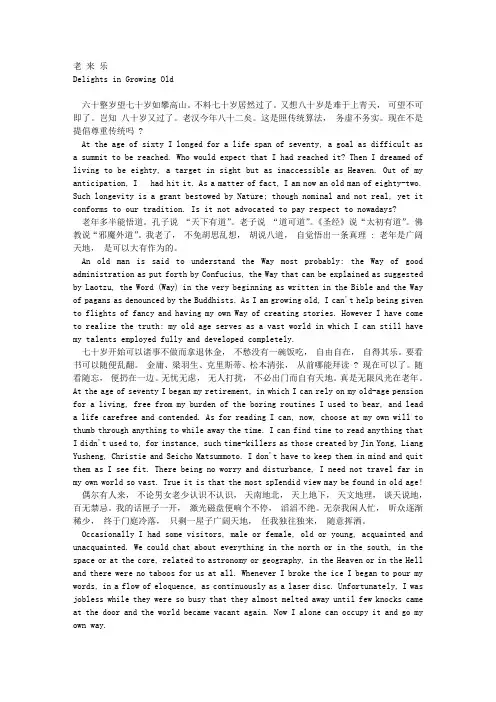
老来乐Delights in Growing Old六十整岁望七十岁如攀高山。
不料七十岁居然过了。
又想八十岁是难于上青天,可望不可即了。
岂知八十岁又过了。
老汉今年八十二矣。
这是照传统算法,务虚不务实。
现在不是提倡尊重传统吗 ?At the age of sixty I longed for a life span of seventy, a goal as difficult as a summit to be reached. Who would expect that I had reached it? Then I dreamed of living to be eighty, a target in sight but as inaccessible as Heaven. Out of my anticipation, I had hit it. As a matter of fact, I am now an old man of eighty-two. Such longevity is a grant bestowed by Nature; though nominal and not real, yet it conforms to our tradition. Is it not advocated to pay respect to nowadays?老年多半能悟道。
孔子说“天下有道”。
老子说“道可道”。
《圣经》说“太初有道”。
佛教说“邪魔外道”。
我老了,不免胡思乱想,胡说八道,自觉悟出一条真理 : 老年是广阔天地,是可以大有作为的。
An old man is said to understand the Way most probably: the Way of good administration as put forth by Confucius, the Way that can be explained as suggested by Laotzu, the Word (Way) in the very beginning as written in the Bible and the Way of pagans as denounced by the Buddhists. As I am growing old, I can't help being given to flights of fancy and having my own Way of creating stories. However I have come to realize the truth: my old age serves as a vast world in which I can still have my talents employed fully and developed completely.七十岁开始可以诸事不做而拿退休金,不愁没有一碗饭吃,自由自在,自得其乐。
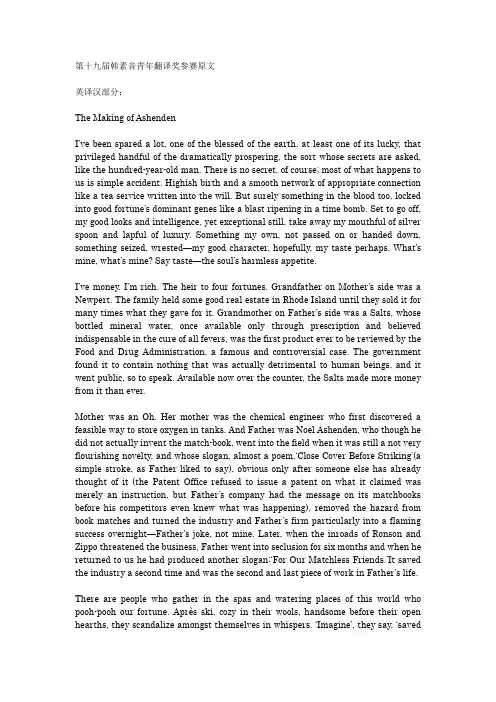
第十九届韩素音青年翻译奖参赛原文英译汉部分:The Making of AshendenI’ve been spared a lot, one of the blessed of the earth, at least one of its lucky, that privileged handful of the dramatically prospering, the sort whose secrets are asked, like the hundred-year-old man. There is no secret, of course; most of what happens to us is simple accident. Highish birth and a smooth network of appropriate connection like a tea service written into the will. But surely something in the blood too, locked into good fortune’s dominant genes like a blast ripening in a time bomb. Set to go off, my good looks and intelligence, yet exceptional still, take away my mouthful of silver spoon and lapful of luxury. Something my own, not passed on or handed down, something seized, wrested—my good character, hopefully, my taste perhaps. What’s mine, what’s mine? Say taste—the soul’s harmless appetite.I’ve money, I’m rich. The heir to four fortunes. Grandfather on Mother’s side was a Newpert. The family held some good real estate in Rhode Island until they sold it for many times what they gave for it. Grandmother on Father’s side was a Salts, whose bottled mineral water, once available only through prescription and believed indispensable in the cure of all fevers, was the first product ever to be reviewed by the Food and Drug Administration, a famous and controversial case. The government found it to contain nothing that was actually detrimental to human beings, and it went public, so to speak. Available now over the counter, the Salts made more money from it than ever.Mother was an Oh. Her mother was the chemical engineer who first discovered a feasible way to store oxygen in tanks. And Father was Noel Ashenden, who though he did not actually invent the match-book, went into the field when it was still a not very flourishing novelty, and whose slogan, almost a poem,‘Close Cover Before Striking’(a simple stroke, as Father liked to say), obvious only after someone else has already thought of it (the Patent Office refused to issue a patent on what it claimed was merely an instruction, but Father’s company had the message on its matchbooks before his competitors even knew what was happening), removed the hazard from book matches and turned the industry and Father’s firm particularly into a flaming success overnight—Father’s joke, not mine. Later, when the inroads of Ronson and Zippo threatened the business, Father went into seclusion for six months and when he returned to us he had produced another slogan:‘For Our Matchless Friends.’It saved the industry a second time and was the second and last piece of work in Father’s life.There are people who gather in the spas and watering places of this world who pooh-pooh our fortune. Après ski, cozy in their wools, handsome before their open hearths, they scandal ize amongst themselves in whispers. ‘Imagine’, they say, ‘savedfrom ruin because of some cornball sentiment available in every bar and grill and truck stop in the country. It’s not, not...’Not what? Snobs! Phooey on the First Families. On railroad, steel mill, automotive, public utility, banking and shipping fortunes, on all hermetic legacy, morganatic and blockbuster blood-lines that change the maps and landscapes and alter the mobility patterns, your jungle wheeling and downtown dealing a stone’s throw from warfare. I come of good stock—real estate, mineral water, oxygen, matchbooks: earth, water, air and fire, the old elementals of the material universe, a bellybutton economics, a linchpin one.It is as I see it a perfect genealogy, and if I can be bought and sold a hundred times over by a thousand men in this country—people in your own town could do it, providents and trailers of hunch, I bless them, who got into this or went into that when it was eight cents a share—I am satisfied with my thirteen or fourteen million. Wealth is not after all the point. The genealogy is. That bridge-trick nexus that brought Newpert to Oh, Salts to Ashenden and Ashenden to Oh, love’s lucky longshots which, paying off, permitted me as they permit every human life! (I have this simple, harmless paranoia of the good-natured man, this cheerful awe.) Forgive my enthusiasm, that I go on like some secular patriot wrapped in the simple flag of self, a professional descendant, every day the closed-for-the-holiday banks and post offices of the heart. And why not? Aren’t my circumstances superb? Whose are better? No boast, no boast. I’ve had it easy, served up on all life’s silver platters like a satrap. And if my money is managed for me and I do no work—less work even than Father, who at least came up with those two slogans, the latter in a six-month solitude that must have been hell for that gregarious man (‘For Our Matchless Friends’: no slogan finally but a broken code, an extension of his own hospitable being, simply the Promethean gift of fire to a guest)—at least I am not ‘spoiled’ and have in me still alive the nerve endings of gratitude. If it’s miserly to count one’s blessings, Brewster Ashenden’s a miser.This will give you some idea of what I’m like:On Having an Account in a Swiss Bank: I never had one, and suggest you stay away from them too. Oh, the mystery and romance is all very well, but never forget that your Swiss bank offers no premiums, whereas for opening a savings account for 5,000 or more at First National City Bank of New York or other fine institutions you get wonderful premiums—picnic hampers, Scotch coolers, Polaroid cameras, Hudson’s Bay blankets from L. L. Bean, electric shavers, even lawn furniture. My managers always leave me a million or so to play wi th, and this is how I do it. I suppose I’ve received hundreds of such bonuses. Usually I give them to friends or as gifts at Christmas to doormen and other loosely connected personnel of the household, but often I keep them and use them myself. I’m not sti ngy. Of course I can afford to buy any of these things — and I do, I enjoy making purchases — but somehow nothing brings the joy of existence home to me more than these premiums. Something fromnothing — the two-suiter from Chase Manhattan and my own existence, luggage a bonus and life a bonus too. Like having a film star next to you on your flight from the Coast. There are treats of high order, adventure like cash in the street.Let’s enjoy ourselves, I say; let’s have fun. Lord, let us live in the sand b y the surf of the sea and play till cows come home. We’ll have a house on the Vineyard and a brownstone in the Seventies and a pied-à-terre in a world capital when something big is about to break. (Put the Cardinal in the back bedroom where the sun gilds the bay at afternoon tea and give us the courage to stand up to secret police at the door, to top all threats with threats of our own, the nicknames of mayors and ministers, the fast comeback at the front stairs, authority on us like the funny squiggle the counterfeiters miss.) Re-Columbus us. Engage us with the overlooked, a knowledge of optics, say, or a gift for the tides. (My pal, the heir to most of the vegetables in inland Nebraska, has become a superb amateur oceanographer. The marine studies people i nvite him to Wood’s Hole each year. He has a wave named for him.) Make us good at things, the countertenor and the German language, and teach us to be as easy in our amateur standing as the best man at a roommate’s wedding. Give us hard tummies behind the cummerbund and long swimmer’s muscles under the hound’s tooth so that we may enjoy our long life. And may all our stocks rise to the occasion of our best possibilities, and our humanness be bullish too.Speaking personally I am glad to be a heroic man.I am pleased that I am attractive to women but grateful I’m no bounder. Though I’m touched when married women fall in love with me, as frequently they do, I am rarely to blame. I never encourage these fits and do my best to get them over their derangements so as not to lose the friendships of their husbands when they are known to me, or the neutral friendship of the ladies themselves. This happens less than you might think, however, for whenever I am a houseguest of a married friend I usually make it a point to bring along a girl. These girls are from all walks of life—models, show girls, starlets, actresses, tennis professionals, singers, heiresses and the daughters of the diplomats of most of the nations of the free world. All walks. They tend, however, to conform to a single physical type, and are almost always tall, tan, slender and blond, the girl from Ipanema as a wag friend of mine has it. They are always sensitive and intelligent and good at sailing and the Australian crawl. They are never blemished in any way, for even something like a tiny beauty mark on the inside of a thigh or above the shoulder blade is enough to put me off, and their breaths must be as sweet at three in the morning as they are at noon. (I never see a woman who is dieting for diet sours the breath.) Arm hair, of course, is repellent to me though a soft blond down is now and then acceptable. I know I sound a prig. I’m not. I am—well, classical, drawn by perfection as to some magnetic, Platonic pole, idealism and beauty’s true North.。
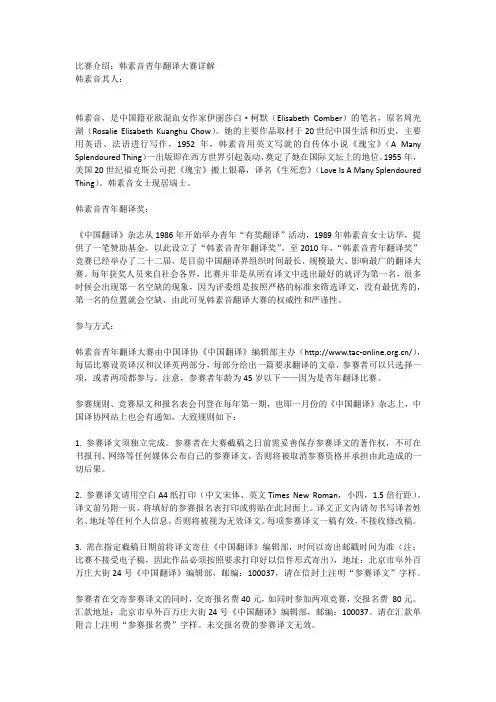
比赛介绍:韩素音青年翻译大赛详解韩素音其人:韩素音,是中国籍亚欧混血女作家伊丽莎白·柯默(Elisabeth Comber)的笔名,原名周光湖(Rosalie Elisabeth Kuanghu Chow)。
她的主要作品取材于20世纪中国生活和历史,主要用英语、法语进行写作,1952年,韩素音用英文写就的自传体小说《瑰宝》(A Many Splendoured Thing)一出版即在西方世界引起轰动,奠定了她在国际文坛上的地位。
1955年,美国20世纪福克斯公司把《瑰宝》搬上银幕,译名《生死恋》(Love Is A Many Splendoured Thing)。
韩素音女士现居瑞士。
韩素音青年翻译奖:《中国翻译》杂志从1986年开始举办青年“有奖翻译”活动,1989年韩素音女士访华,提供了一笔赞助基金,以此设立了“韩素音青年翻译奖”。
至2010年,“韩素音青年翻译奖”竞赛已经举办了二十二届,是目前中国翻译界组织时间最长、规模最大、影响最广的翻译大赛。
每年获奖人员来自社会各界,比赛并非是从所有译文中选出最好的就评为第一名,很多时候会出现第一名空缺的现象,因为评委组是按照严格的标准来筛选译文,没有最优秀的,第一名的位置就会空缺,由此可见韩素音翻译大赛的权威性和严谨性。
参与方式:韩素音青年翻译大赛由中国译协《中国翻译》编辑部主办(/),每届比赛设英译汉和汉译英两部分,每部分给出一篇要求翻译的文章,参赛者可以只选择一项,或者两项都参与。
注意,参赛者年龄为45岁以下——因为是青年翻译比赛。
参赛规则、竞赛原文和报名表会刊登在每年第一期,也即一月份的《中国翻译》杂志上,中国译协网站上也会有通知,大致规则如下:1. 参赛译文须独立完成。
参赛者在大赛截稿之日前需妥善保存参赛译文的著作权,不可在书报刊、网络等任何媒体公布自己的参赛译文,否则将被取消参赛资格并承担由此造成的一切后果。
2. 参赛译文请用空白A4纸打印(中文宋体、英文Times New Roman,小四,1.5倍行距)。
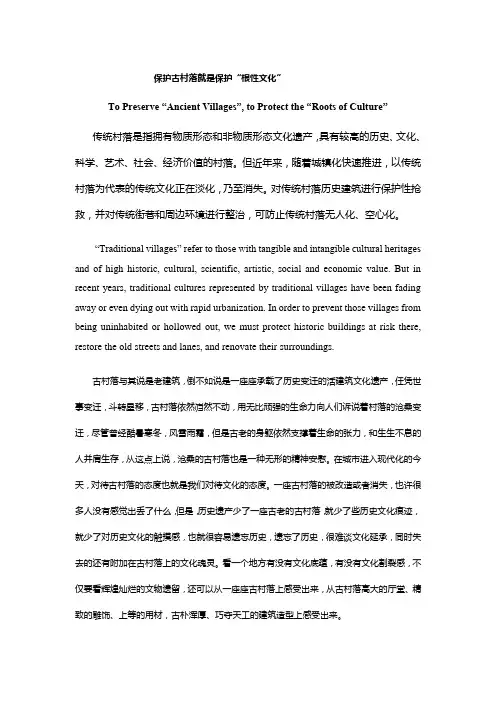
保护古村落就是保护“根性文化”To Preserve “Ancient Villages”, to Protect the “Roots of Culture”传统村落是指拥有物质形态和非物质形态文化遗产,具有较高的历史、文化、科学、艺术、社会、经济价值的村落。
但近年来,随着城镇化快速推进,以传统村落为代表的传统文化正在淡化,乃至消失。
对传统村落历史建筑进行保护性抢救,并对传统街巷和周边环境进行整治,可防止传统村落无人化、空心化。
“Traditional villages” refer to those with tangible and intangible cultural heritages and of high historic, cultural, scientific, artistic, social and economic value. But in recent years, traditional cultures represented by traditional villages have been fading away or even dying out with rapid urbanization. In order to prevent those villages from being uninhabited or hollowed out, we must protect historic buildings at risk there, restore the old streets and lanes, and renovate their surroundings.古村落与其说是老建筑,倒不如说是一座座承载了历史变迁的活建筑文化遗产,任凭世事变迁,斗转星移,古村落依然岿然不动,用无比顽强的生命力向人们诉说着村落的沧桑变迁,尽管曾经酷暑寒冬,风雪雨霜,但是古老的身躯依然支撑着生命的张力,和生生不息的人并肩生存,从这点上说,沧桑的古村落也是一种无形的精神安慰。
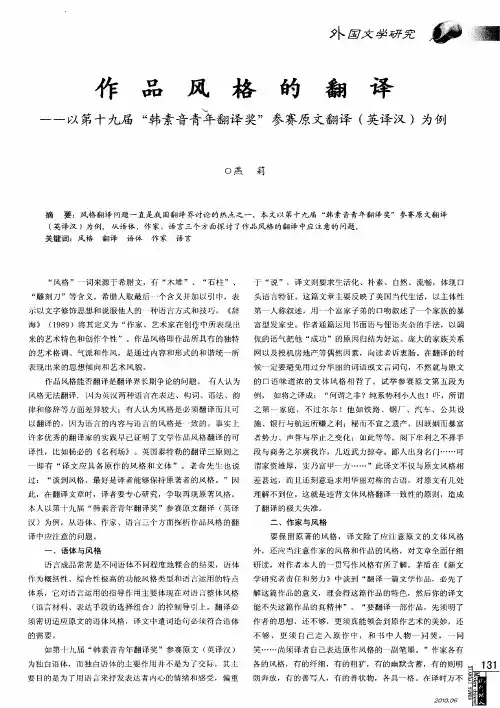
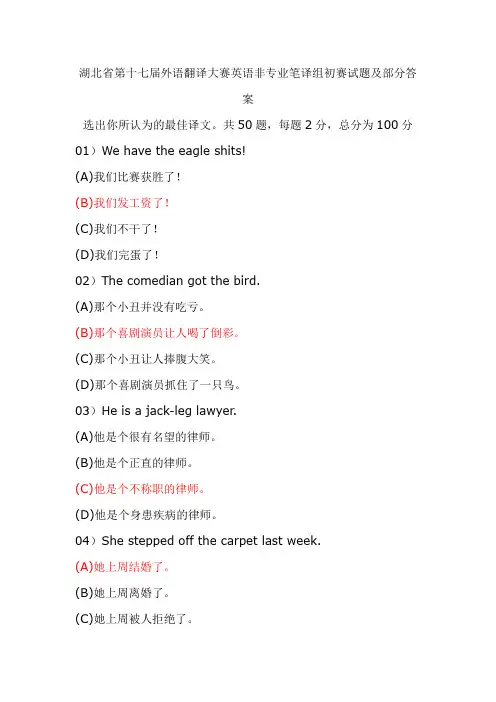
湖北省第十七届外语翻译大赛英语非专业笔译组初赛试题及部分答案选出你所认为的最佳译文。
共50题,每题2分,总分为100分01)We have the eagle shits!(A)我们比赛获胜了!(B)我们发工资了!(C)我们不干了!(D)我们完蛋了!02)The comedian got the bird.(A)那个小丑并没有吃亏。
(B)那个喜剧演员让人喝了倒彩。
(C)那个小丑让人捧腹大笑。
(D)那个喜剧演员抓住了一只鸟。
03)He is a jack-leg lawyer.(A)他是个很有名望的律师。
(B)他是个正直的律师。
(C)他是个不称职的律师。
(D)他是个身患疾病的律师。
04)She stepped off the carpet last week.(A)她上周结婚了。
(B)她上周离婚了。
(C)她上周被人拒绝了。
(D)她上周拒绝参加婚礼。
05)The young man had a fling at swimming.(A)那个小伙子尝试学游泳。
(B)那个小伙子害怕游泳。
(C)那个小伙子对游泳不感兴趣。
(D)那个小伙子喜欢游泳。
06)Mike bought the farm in the World War II(A)迈克在二战中发了大财。
(B)迈克在二战中购买农场。
(C)迈克在二战中阵亡。
(D)迈克在二战中过得很安逸。
07)He was called to the bar at 21.(A)他21岁就被关进了牢房。
(B)他21岁就取得了律师资格。
(C)他21岁就取得了调酒师资格。
(D)他21岁就取得了医生资格。
08)I am as old again as you.(A)我现在长大了,和你一样。
(B)还没有你那么老。
(C)我又和你一样老了。
(D)我的年纪比你大一倍。
09)He is a fair-haired boy of the boss.(A)他常受到老板的使唤。
(B)他是老板的大红人。
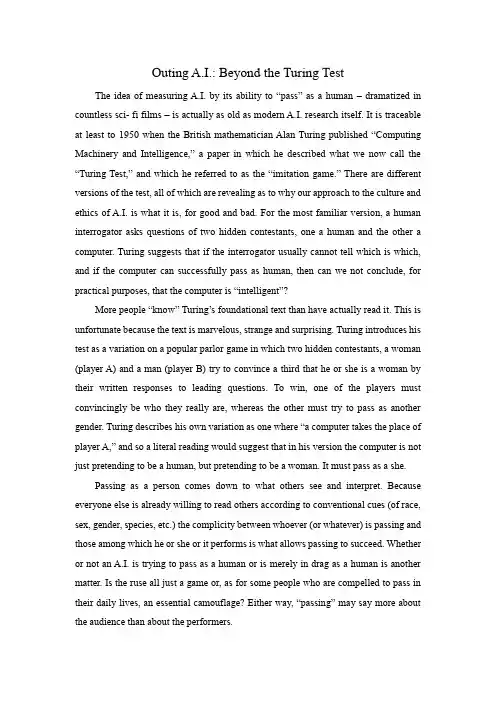
Outing A.I.: Beyond the Turing TestThe idea of measuring A.I. by its ability to “pass” as a human – dramatized in countless sci- fi films – is actually as old as modern A.I. research itself. It is traceable at least to 1950 when the British mathematician Alan Turing published “Computing Machinery and Intelligence,” a paper in which he described what we now call the “Turing Test,” and which he referred to as the “imitation game.” There are different versions of the test, all of which are revealing as to why our approach to the culture and ethics of A.I. is what it is, for good and bad. For the most familiar version, a human interrogator asks questions of two hidden contestants, one a human and the other a computer. Turing suggests that if the interrogator usually cannot tell which is which, and if the computer can successfully pass as human, then can we not conclude, for practical purposes, that the computer is “intelligent”?More people “know” Turing’s foundational text than have actually read it. This is unfortunate because the text is marvelous, strange and surprising. Turing introduces his test as a variation on a popular parlor game in which two hidden contestants, a woman (player A) and a man (player B) try to convince a third that he or she is a woman by their written responses to leading questions. To win, one of the players must convincingly be who they really are, whereas the other must try to pass as another gender. Turing describes his own variation as one where “a computer takes the place of player A,” and so a literal reading would suggest that in his version the computer is not just pretending to be a human, but pretending to be a woman. It must pass as a she.Passing as a person comes down to what others see and interpret. Because everyone else is already willing to read others according to conventional cues (of race, sex, gender, species, etc.) the complicity between whoever (or whatever) is passing and those among which he or she or it performs is what allows passing to succeed. Whether or not an A.I. is trying to pass as a human or is merely in drag as a human is another matter. Is the ruse all just a game or, as for some people who are compelled to pass in their daily lives, an essential camouflage? Either way, “passing” may say more about the audience than about the performers.That we would wish to define the very existence of A.I. in relation to its ability to mimic how humans think that humans think will be looked back upon as a weird sort of speciesism. The legacy of that conceit helped to steer some older A.I. research down disappointingly fruitless paths, hoping to recreate human minds from available parts. It just doesn’t work that way. Contemporary A.I. research suggests instead that the threshold by which any particular arrangement of matter can be said to be “intelligent” doesn’t have much to do with how it reflects humanness back at us. As Stuart Russell and Peter Norvig (now director of research at Google) suggest in their essential A.I. textbook, biomorphic imitation is not how we design complex technology. Airplanes don’t fly like birds fly, and we certainly don’t try to trick birds into thinking that airplanes are birds in order to test whether those planes “really” are flying machines. Why do it for A.I. then? Today’s serious A.I. research does not focus on the Turing Test as an objective criterion of success, and yet in our popular culture of A.I., the test’s anthropocentrism holds such durable conceptual importance. Like the animals who talk like teenagers in a Disney movie, other minds are conceivable mostly by way of puerile ventriloquism.Where is the real injury in this? If we want everyday A.I. to be congenial in a humane sort of way, so what? The answer is that we have much to gain from a more sincere and disenchanted relationship to synthetic intelligences, and much to lose by keeping illusions on life support. Some philosophers write about the possible ethical “rights” of A.I. as sentient entities, but that’s not my point here. Rather, the truer perspective is also the better one for us as thinking technical creatures.Musk, Gates and Hawking made headlines by speaking to the dangers that A.I. may pose. Their points are important, but I fear were largely misunderstood by many readers. Relying on efforts to program A.I. not to “harm humans” (inspired by Isaac Asimov’s “three laws” of robotics from 1942) makes sense only when an A.I. knows what humans are and what harming them might mean. There are many ways that an A.I. might harm us that have nothing to do with its malevolence toward us, and chief among these is exactly following our well-meaning instructions to an idiotic and catastrophic extreme. Instead of mechanical failure or a transgression of moral code, the A.I. maypose an existential risk because it is both powerfully intelligent and disinterested in humans. To the extent that we recognize A.I. by its anthropomorphic qualities, or presume its preoccupation with us, we are vulnerable to those eventualities.Whether or not “hard A.I.” ever appears, the harm is also in the loss of all that we prevent ourselves from discovering and understanding when we insist on protecting beliefs we know to be false. In the 1950 essay, Turing offers several rebuttals to his speculative A.I., including a striking comparison with earlier objections to Copernican astronomy. Copernican traumas that abolish the false centrality and absolute specialness of human thought and species-being are priceless accomplishments. They allow for human culture based on how the world actually is more than on how it appears to us from our limited vantage point. Turing referred to these as “theological objections,” but one could argue that the anthropomorphic precondition for A.I. is a “pre-Copernican” attitude as well, however secular it may appear. The advent of robust inhuman A.I. may let us achieve another disenchantment, one that should enable a more reality-based understanding of ourselves, our situation, and a fuller and more complex understanding of what “intelligence” is and is not. From there we can hopefully make our world with a greater confidence that our models are good approximations of what’s out there.人工智能:超越图灵实验以人工智能“冒充”人的能力的来衡量人工智能的这个概念---已经被数不清的科幻电影搬上了荧幕---实际上已经和现代人工智能研究一样久远了。
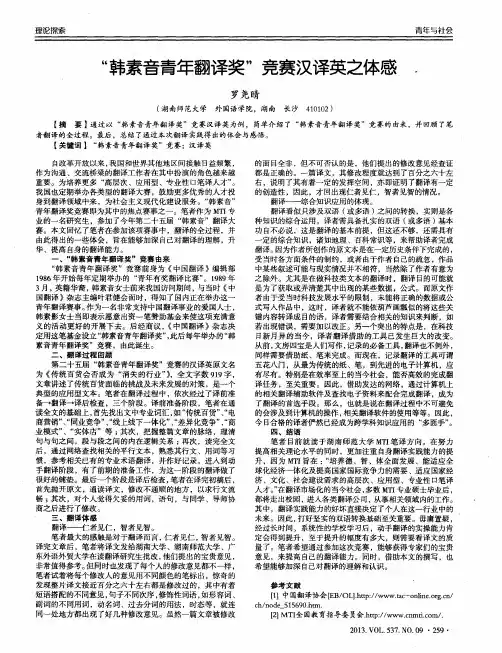
![第十七届韩素音翻译大赛英译汉部分原文[策划]](https://uimg.taocdn.com/aac8e447ac02de80d4d8d15abe23482fb4da02c8.webp)
第十七届韩素音翻译大赛英译汉部分原文Beauty (excerpt)Judging from the scientists I know, including Eva and Ruth, and those I’ve read about, you can’t pursue the laws of nature very long without bumping into beauty. “I don’t know if it’s the same beauty you see in the sunset,” a friend tells me, “but it feels the same.” This friend is a physicist, who has spent a long career deciphering what must be happening in the interior of stars. He recalls for me this thrill on grasping for the first time Dirac’s equations describing quantum mechanics, or those of Einstein describing relativity. “They’re so beautiful,” he says,” you can see immediately they have to be true. Or at least on the way toward trut h.” I ask him what makes a theory beautiful, and he replies, “Simplicity, symmetry, elegance, and power.”Why nature should conform to theories we find beautiful is far from obvious. The most incomprehensible thing about the universe, as Einstein said, is that it’s comprehensible. How unlikely, that a short—lived biped on a two--bit planet should be able to gauge the speed of light, lay bare the structure of an atom, or calculate the gravitational tug of a black hole. We’re a long way from understanding everything, but we do understand a great deal about how nature behaves. Generation after generation, we puzzle out formulas, test them, and find, to an astonishing degree, that nature agrees. An architect draws designs on flimsy paper, and her buildings stand up through earthquakes. We launch a satellite into orbit and use it to bounce messages from continent to continent. The machine on which I write these words embodies hundreds of insights into the workings of the material world, insights that are confirmed by every burst of letters on the screen, and I stare at thatscreen through lenses that obey the laws of optics first worked out in detail by Issac Newton.By discerning patterns in the universe, Newton believed, he was tracing the hand of God. Scientists in our day have largely abandoned the notion of a Creator as an unnecessary hypothesis, or at least an untestable one. While they share Newton’s faith that t he universe is ruled everywhere by a coherent set of rules, they cannot say, as scientists, how these particular rules came to govern things. You can do science without believing in a divine Legislator, but not without believing in laws.I spent my teenage years scrambling up the mountain of mathematics. Midway up the slope, I staggered to a halt, gasping in the rarefied air, well before I reached the heights where the equations of Einstein and Dirac would have made sense. Nowadays I add, subtract, multiply, and do long division when no calculator is handy, and I can do algebra and geometry and even trigonometry in a pinch, but that is about all that I’ve kept from the language of numbers. Still, I remember glimpsing patterns in mathematics that seemed as bold and beautiful as a skyful of stars.I’m never more aware of the limitations of language than when I try to describe beauty. Language can create its own loveliness, of course, but it cannot deliver to us the radiance we apprehend in the world, any more than a photograph can capture the stunning swiftness of a hawk or the withering power of a supernova. Eva’s wedding album holds only a faint glimmer of the wedding itself. All that pictures or words can do is gesture beyond themselves toward the fleeting glory that stirs our hearts. So I keep gesturing.“All nature is meant to make us think of paradise,”Thomas Merton observed. Because the Creation puts on a nonstop show, beauty is free and inexhaustible, but we need training in order to perceive more than the most obvious kinds. Even 15 billion years or so after the Big Bang, echoes of that event still linger in the form of background radiation, only a few degrees above absolute zero. Just so, I believe, the experience of beauty is an echo of the order and power that permeate the universe. To measure background radiation, we need subtle instruments; to measure beauty, we need alert intelligence and our five keen senses.Anyone with eyes can take delight in a face or a flower. You need training, however, to perceive the beauty in mathematics or physics or chess, in the architecture of a tree, the design of a bird’s wing, or the shiver of breath through a flute. For most of human history, the training has come from elders who taught the young how to pay attention. By paying attention, we learn to savor all sorts of patterns, from quantum mechanics to patchwork quilts. This predilection brings with it a clear evolutionary advantage, for the ability to recognize patterns helped our ancestors to select mates, find food, avoid predators. But the same advantage would apply to all species, and yet we alone compose symphonies and crossword puzzles, carve stone into statues, map time and space.Have we merely carried our animal need for shrewd perceptions to an absurd extreme? Or have we stumbled onto a deep congruence between the structure of our minds and the structure of the universe?I am persuaded the latter is true. I am convinced there’s more to beauty than biology, more than cultural convention. It flows around and through us in such abundance, and in such myriad forms, as to exceed by a wide margin any mereevolutionary need. Which is not to say that beauty has nothing to do with survival: I think it has everything to do with survival. Beauty feeds us from the same source that created us. It reminds us of the shaping power that reaches through the flower stem and through our own hands. It restores our faith in the generosity of nature. By giving us a taste of the kinship between our own small minds and the great Mind of the Cosmos, beauty reassures us that we are exactly and wonderfully made for life on this glorious planet, in this magnificent universe.I find in that affinity a profound source of meaning and hope.A universe so prodigal of beauty may actually need us to notice and respond, may need our sharp eyes and brimming hearts and teeming minds, in order to close the circuit of Creation.美在其中(节选)我认识的科学家,像伊凡和卢斯,还有我通过阅读了解的科学家,普遍认为人们在探索自然界规律的过程中,很快便能与美不期而遇。
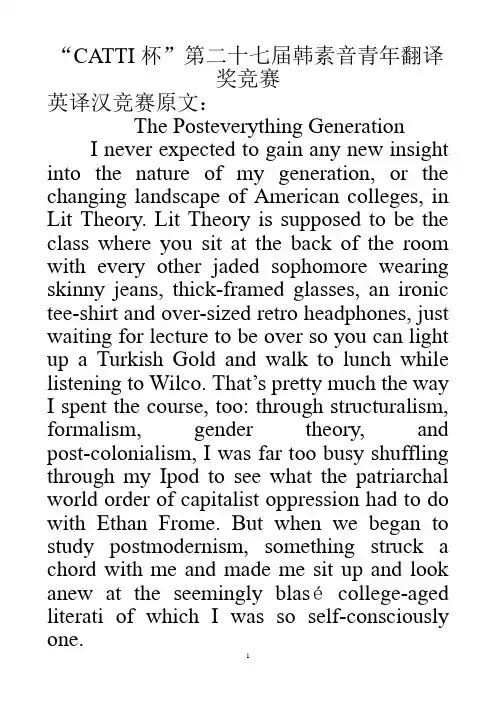
“CATTI杯”第二十七届韩素音青年翻译奖竞赛英译汉竞赛原文:The Posteverything GenerationI never expected to gain any new insight into the nature of my generation, or the changing landscape of American colleges, in Lit Theory. Lit Theory is supposed to be the class where you sit at the back of the room with every other jaded sophomore wearing skinny jeans, thick-framed glasses, an ironic tee-shirt and over-sized retro headphones, just waiting for lecture to be over so you can light up a Turkish Gold and walk to lunch while listening to Wilco. That’s pretty much the way I spent the course, too: through structuralism, formalism, gender theory, and post-colonialism, I was far too busy shuffling through my Ipod to see what the patriarchal world order of capitalist oppression had to do with Ethan Frome. But when we began to study postmodernism, something struck a chord with me and made me sit up and look anew at the seemingly blasécollege-aged literati of which I was so self-consciously one.According to my textbook, the problem with defining postmodernism is that it’s impossible. The difficulty is that it is so...post. It defines itself so negatively against what came before it –naturalism, romanticism and the wild revolution of modernism –that it’s sometimes hard to see what it actually is. It denies that anything can be explained neatly or even at all. It is parodic, detached, strange, and sometimes menacing to traditionalists who do not understand it. Although it arose in the post-war west (the term was coined in 1949), the generation that has witnessed its ascendance has yet to come up with an explanation of what postmodern attitudes mean for the future of culture or society. The subject intrigued me because, in a class otherwise consumed by dead-letter theories, postmodernism remained an open book, tempting to the young and curious. But it also intrigued me because the question of what postmodernism –what a movement so post-everything, so reticent to define itself –is spoke to a larger question about the political and popular culture of today, of the other jaded sophomores sitting around mewho had grown up in a postmodern world.In many ways, as a college-aged generation, we are also extremely post: post-Cold War, post-industrial, post-baby boom, post-9/11...at one point in his famous essay, “Postmodernism, or the Cultural Logic of Late Capitalism,”literary critic Frederic Jameson even calls us “post-literate.” We are a generation that is riding on the tail-end of a century of war and revolution that toppled civilizations, overturned repressive social orders, and left us with more privilege and opportunity than any other society in history. Ours could be an era to accomplish anything.And yet do we take to the streets and the airwaves and say “here we are, and this is what we demand”? Do we plant our flag of youthful rebellion on the mall in Washington and say “we are not leaving until we see change! Our eyes have been opened by our education and our conception of what is possible has been expanded by our privilege and we demand a better world because it is our right”? It would seem we do the opposite. We go to war without so much as questioning the rationale, we sign away our civil liberties,we say nothing when the Supreme Court uses Brown v. Board of Education to outlaw desegregation, and we sit back to watch the carnage on the evening news.On campus, we sign petitions, join organizations, put our names on mailing lists, make small-money contributions, volunteer a spare hour to tutor, and sport an entire wardrobe’s worth of Live Strong bracelets advertising our moderately priced opposition to everything from breast cancer to global warming. But what do we really stand for? Like a true postmodern generation we refuse to weave together an overarching narrative to our own political consciousness, to present a cast of inspirational or revolutionary characters on our public stage, or to define a specific philosophy. We are a story seemingly without direction or theme, structure or meaning –a generation defined negatively against what came before us. When Al Gore once said “It’s the combination of narcissism and nihilism that really defines postmodernism,” he might as well have been echoing his entire generation’s critique of our own. We are a generation for whom evenrevolution seems trite, and therefore as fair a target for bland imitation as anything else. We are the generation of the Che Geuvera tee-shirt.Jameson calls it “Pastiche”–“the wearing of a linguistic mask, speech in a dead language.” In literature, this means an author speaking in a style that is not his own –borrowing a voice and continuing to use it until the words lose all meaning and the chaos that is real life sets in. It is an imitation of an imitation, something that has been re-envisioned so many times the original model is no longer relevant or recognizable. It is mass-produced individualism, anticipated revolution. It is why postmodernism lacks cohesion, why it seems to lack purpose or direction. For us, the post-everything generation, pastiche is the use and reuse of the old clichés of social change and moral outrage –a perfunctory rebelliousness that has culminated in the age of rapidly multiplying non-profits and relief funds. We live our lives in masks and speak our minds in a dead language –the language of a society that expects us to agitate because that’s whatyoung people do. But how do we rebel against a generation that is expecting, anticipating, nostalgic for revolution?How do we rebel against parents that sometimes seem to want revolution more than we do? We don’t. We rebel by not rebelling. We wear the defunct masks of protest and moral outrage, but the real energy in campus activism is on the internet, with websites like . It is in the rapidly developing ability to communicate ideas and frustration in chatrooms instead of on the streets, and channel them into nationwide projects striving earnestly for moderate and peaceful change: we are the generation of Students Taking Action Now Darfur; we are the Rock the V ote generation; the generation of letter-writing campaigns and public interest lobbies; the alternative energy generation.College as America once knew it –as an incubator of radical social change –is coming to an end. To our generation the word “radicalism”evokes images of al Qaeda, not the Weathermen. “Campus takeover”sounds more like Virginia Tech in 2007 than Columbia University in 1968. Such phrasesare a dead language to us. They are vocabulary from another era that does not reflect the realities of today. However, the technological revolution, the revolution, the revolution of the organization kid, is just as real and just as profound as the revolution of the 1960’s –it is just not as visible. It is a work in progress, but it is there. Perhaps when our parents finally stop pointing out the things that we are not, the stories that we do not write, they will see the threads of our narrative begin to come together; they will see that behind our pastiche, the post generation speaks in a language that does make sense. We are writing a revolution. We are just putting it in our own words.汉译英竞赛原文:保护古村落就是保护“根性文化”传统村落是指拥有物质形态和非物质形态文化遗产,具有较高的历史、文化、科学、艺术、社会、经济价值的村落。
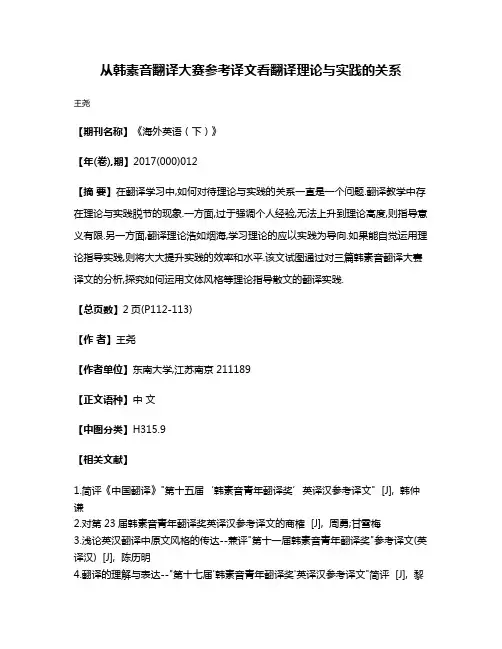
从韩素音翻译大赛参考译文看翻译理论与实践的关系
王尧
【期刊名称】《海外英语(下)》
【年(卷),期】2017(000)012
【摘要】在翻译学习中,如何对待理论与实践的关系一直是一个问题.翻译教学中存在理论与实践脱节的现象.一方面,过于强调个人经验,无法上升到理论高度,则指导意义有限.另一方面,翻译理论浩如烟海,学习理论的应以实践为导向.如果能自觉运用理论指导实践,则将大大提升实践的效率和水平.该文试图通过对三篇韩素音翻译大赛译文的分析,探究如何运用文体风格等理论指导散文的翻译实践.
【总页数】2页(P112-113)
【作者】王尧
【作者单位】东南大学,江苏南京211189
【正文语种】中文
【中图分类】H315.9
【相关文献】
1.简评《中国翻译》"第十五届‘韩素音青年翻译奖’英译汉参考译文" [J], 韩仲谦
2.对第23届韩素音青年翻译奖英译汉参考译文的商榷 [J], 周勇;甘雪梅
3.浅论英汉翻译中原文风格的传达--兼评"第十一届韩素音青年翻译奖"参考译文(英译汉) [J], 陈历明
4.翻译的理解与表达--"第十七届'韩素音青年翻译奖'英译汉参考译文"简评 [J], 黎
土旺
5.从韩素音翻译大赛参考译文看翻译理论与实践的关系 [J], 王尧
因版权原因,仅展示原文概要,查看原文内容请购买。
韩素音青年翻译奖竞赛原文第二十六届“韩素音青年翻译奖”竞赛原文英译汉竞赛原文:How the News Got Less MeanThe most read article of all time on BuzzFeed contains no photographs of celebrity nip slips and no inflammatory ranting. It’s a series of photos called “21 pictures that will restore your faith in humanity,”which has pulled in nearly 14 million visits so far. At Upworthy too, hope is the major draw. “This kid just died. What he left behind is wondtacular,”an Upworthy post about a terminally ill teen singer, earned 15 million views this summer and has raised more than $300,000 for cancer research.The recipe for attracting visitors to stories online is changing. Bloggers have traditionally turned to sarcasm and snark to draw attention. But the success of sites like BuzzFeed and Upworthy, whose philosophies embrace the viral nature of upbeat stories, hints that the Web craves positivity.The reason: social media. Researchers are discovering that people want to create positive images of themselves online by sharing upbeat stories. And with more people turning to Facebook and Twitter to find out what’s happening in the world, news stories may need to cheer up inorder to court an audience. If social is the future of media, then optimistic stories might be media’s future.“When we started, the prevailing wisdom was that snark ruled the Internet,”says Eli Pariser, a co-founder of Upworthy. “And we just had a really different sense of what works.”“You don’t want to be that guy at the party who’s crazy and angry and ranting in the corner —it’s the same for Twitteror Facebook,”he says. “Part of what we’re trying to d o with Upworthy is give people the tools to express a conscientious, thoughtful and positive identity in social media.”And the science appears to support Pariser’s philosophy. In a recent study from the Massachusetts Institute of Technology, researchers f ound that “up votes,”showing that a visitor liked a comment or story, begat more up votes on comments on the site, but “down votes”did not do the same. In fact, a single up vote increased the likelihood that someone else would like a comment by 32%, wherea s a down vote had no effect. People don’t want to support the cranky commenter, the critic or the troll. Nor do they want to be that negative personality online.In another study published in 2012, Jonah Berger, author of Contagious: Why Things Catch On and professor of marketing at the Wharton School of the University of Pennsylvania, monitored the most e-mailed stories produced by the New York Times for six months andfound that positive stories were more likely to make the list than negative ones.“What we share [or like] is almost like the car we drive or the clothes we wear,”he says. “It says something about us to other people. So people would much rather be seen as a Positive Polly than a Debbie Downer.”It’s not always that simple: Berger says that th ough positive pieces drew more traffic than negative ones, within the categories of positive and negative stories, those articles that elicited more emotion always led to more shares.“Take two negative emotions, for example: anger and sadness,”Berger says. “Both of those emotions would make the reader feel bad. But anger, a high arousal emotion, leads to moresharing, whereas sadness, a low arousal emotion, doesn’t. The same is true of the positive side: excitement and humor increase sharing, whereas conte ntment decreases sharing.”And while some popular BuzzFeed posts —like the recent “Is this the most embarrassing interview Fox News has ever done?”—might do their best to elicit shares through anger, both BuzzFeed and Upworthy recognize that their main success lies in creating positive viral material.“It’s not that people don’t share negative stories,”says Jack Shepherd, editorial director at BuzzFeed. “It just means that there’s ahigher potential for positive stories to do well.”Upworthy’s mission is to highlight serious issues but in a hopeful way, encouraging readers to donate money, join organizations and take action. The strategy seems to be working: barely two years after its launch date (in March 2012), the site now boasts 30 million unique visitors per month, according to Upworthy. The site’s average monthly unique visitors grew to 14 million people over its first six quarters —to put that in perspective, the Huffington Post had only about 2 million visitors in its first six quarters online.But Upworthy measures the success of a story not just by hits. The creators of the site only consider a post a success if it’s also shared frequently on social media. “We are interested in content that people want to share partly for pragmatic reasons,”Pariser s ays. “If you don’t have a good theory about how to appear in Facebook and Twitter, then you may disappear.”Nobody has mastered the ability to make a story go viral like BuzzFeed. The site, which began in 2006 as a lab to figure out what people share onlin e, has used what it’s learned to draw 60million monthly unique visitors, according to BuzzFeed. (Most of that traffic comes from social-networking sites, driving readers toward BuzzFeed’s mix of cute animal photos and hard news.) By comparison the New York Times website, one of the most popular newspaper sites on the Web,courts only 29 million unique visitors each month, according to the Times.BuzzFeed editors have found that people do still read negative or critical stories, they just aren’t the posts t hey share with their friends. And those shareable posts are the ones that newsrooms increasingly prize.“Anecdotally, I can tell you people are just as likely to click on negative stories as they are to click on positive ones,”says Shepherd. “But they’re m ore likely to share positive stories. What you’re interested in is different from what you want your friends to see what you’re interested in.”So as newsrooms re-evaluate how they can draw readers and elicit more shares on Twitter and Facebook, they may look to BuzzFeed’s and Upworthy’s happiness model for direction.“I think that the Web is only becoming more social,”Shepherd says. “We’re at a point where readers are your publishers. If news sites aren’t thinking about what it would mean for someone to share a story on social media, that could be detrimental.”汉译英竞赛原文:城市的迷失沿着瑗珲—腾冲线,这条1935年由胡焕庸先生发现并命名的中国人口、自然和历史地理的分界线,我们看到,从远距离贸易发展开始的那天起,利益和权力的渗透与分散,已经从根本结构上改变了城市的状态:城市在膨胀,人在疏离。
保护古村落就是保护“根性文化”To Preserve “Ancient Villages”, to Protect the “Roots of Culture”传统村落是指拥有物质形态和非物质形态文化遗产,具有较高的历史、文化、科学、艺术、社会、经济价值的村落。
但近年来,随着城镇化快速推进,以传统村落为代表的传统文化正在淡化,乃至消失。
对传统村落历史建筑进行保护性抢救,并对传统街巷和周边环境进行整治,可防止传统村落无人化、空心化。
“Traditional villages” refer to those with tangible and intangible cultural heritages and of high historic, cultural, scientific, artistic, social and economic value. But in recent years, traditional cultures represented by traditional villages have been fading away or even dying out with rapid urbanization. In order to prevent those villages from being uninhabited or hollowed out, we must protect historic buildings at risk there, restore the old streets and lanes, and renovate their surroundings.古村落与其说是老建筑,倒不如说是一座座承载了历史变迁的活建筑文化遗产,任凭世事变迁,斗转星移,古村落依然岿然不动,用无比顽强的生命力向人们诉说着村落的沧桑变迁,尽管曾经酷暑寒冬,风雪雨霜,但是古老的身躯依然支撑着生命的张力,和生生不息的人并肩生存,从这点上说,沧桑的古村落也是一种无形的精神安慰。
英译汉原文:Are We There Yet?America’s recovery will be much slower than that from most recessions; but the government can help a bit.“WHITHER goest thou, America?” That question, posed by Jack Kerouac on behalf of the Beat generation half a century ago, is the biggest uncertainty hanging over the world economy. And it reflects the foremost worry for American voters, who go to the polls for the congressional mid-term elections on November 2nd with the country’s unemployment rate stubbornly stuck at nearly one in ten. They should prepare themselves for a long, hard ride.The most wrenching recession since the 1930s ended a year ago. But the recovery—none too powerful to begin with—slowed sharply earlier this year. GDP grew by a feeble 1.6% at an annual pace in the second quarter, and seems to have been stuck somewhere similar since. The housing market slumped after temporary tax incentives to buy a home expired. So few private jobs were being created that unemployment looked more likely to rise than fall. Fears grew over the summer that if this deceleration continued, America’s economy would slip back into recession.Fortunately, those worries now seem exaggerated. Part of the weakness of second-quarter GDP was probably because of a temporary surge in imports from China. The latest statistics, from reasonably good retail sales in August to falling claims for unemployment benefits, point to an economy that, though still weak, is not slumping further. And history suggests that although nascent recoveries often wobble for a quarter or two, they rarely relapse into recession. For now, it is most likely that America’s economy will crawl along with growth at perhaps 2.5%: above stall speed, but far too slow to make much difference to the jobless rate.Why, given that America usually rebounds from recession, are the prospects so bleak? That’s because most past recessions have been caused by tight monetary policy. When policy is loosened, demand rebounds. This recession was the result of a financial crisis. Recoveries after financial crises are normally weak and slow as banking systems are repaired and balance-sheets rebuilt. Typically, this period of debt reduction lasts around seven years, which means America would emerge from it in 2014. By some measures, households are reducing their debt burdens unusually fast, but even optimistic seers do not think the process is much more than half over.Battling on the busAmerica’s biggest problem is that its poli ticians have yet to acknowledge that the economy is in for such a long, slow haul, let alone prepare for the consequences.A few brave officials are beginning to sound warnings that the jobless rate is likely to “stay high”. But the political debate is mor e about assigning blame for the recession than about suggesting imaginative ways to give more oomph to the recovery. Republicans argue that Barack Obama’s shift towards “big government” explainsthe economy’s weakness, and that high unemployment is proof t hat fiscal stimulus was a bad idea. In fact, most of the growth in government to date has been temporary and unavoidable; the longer-run growth in government is more modest, and reflects the policies of both Mr Obama and his predecessor. And the notion that high joblessness “proves” that stimulus failed is simply wrong. The mechanics of a financial bust suggest that without a fiscal boost the recession would have been much worse.Democrats have their own class-warfare version of the blame game, in which Wall Street’s excesses caused the problem and higher taxes on high-earners are part of the solution. That is why Mr. Obama’s legislative priority before the mid-terms is to ensure that the Bush tax cuts expire at the end of this year for households earning more than $250,000 but are extended for everyone else.This takes an unnecessary risk with the short-term recovery. America’s experience in 1937 and Japan’s in 1997 are powerful evidence that ill-timed tax rises can tip weak economies back into recession. Higher taxes at the top, along with the waning of fiscal stimulus and belt-tightening by the states, will make a weak growth rate weaker still. Less noticed is that Mr. Obama’s fiscal plan will also worsen the medium-term budget mess, by making tax cuts for the middle class permanent.Ways to overhaul the engineIn an ideal world America would commit itself now to the medium-term tax reforms and spending cuts needed to get a grip on the budget, while leaving room to keep fiscal policy loose for the moment. But in febrile, partisan Washington that is a pipe-dream. Today’s goals can only be more modest: to nurture the weak economy, minimize uncertainty and prepare the ground for tomorrow’s fiscal debate. To that end, Congress ought to extend all the Bush tax cuts until 2013. Then they should all expire—prompting a serious fiscal overhaul, at a time when the economy is stronger.A broader set of policies could help to work off the hangover faster. One priority is to encourage more write-downs of mortgage debt. Almost a quarter of all Americans with mortgages owe more than their houses are worth. Until that changes the vicious cycle of rising foreclosures and falling prices will continue. There are plenty of ideas on offer, from changing the bankruptcy law so that judges can restructure mortgage debt to empowering special trustees to write down loans. They all have drawbacks, but a fetid pool of underwater mortgages will, much like Japan’s loans to zombie firms, corrode the financial system and harm the recovery.C leaning up the housing market would help cut America’s unemployment rate, by making it easier for people to move to where jobs are. But more must be done to stop high joblessness becoming entrenched. Payroll-tax cuts and credits to reduce the cost of hiring would help. (The health-care reform, alas, does the opposite, at least for small businesses.) Politicians will also have to think harder about training schemes, because some workers lack the skills that new jobs require.Americans are used to great distances. The sooner they, and their politicians, acceptthat the road to recovery will be a long one, the faster they will get there.译文:我们到达目的地了吗?与大多数衰退之后的复苏相比,这次美国经济的复苏会慢得多。
老来乐Delights in Growing Old六十整岁望七十岁如攀高山。
不料七十岁居然过了。
又想八十岁是难于上青天,可望不可即了。
岂知八十岁又过了。
老汉今年八十二矣。
这是照传统算法,务虚不务实。
现在不是提倡尊重传统吗 ?At the age of sixty I longed for a life span of seventy, a goal as difficult as a summit to be reached. Who would expect that I had reached it? Then I dreamed of living to be eighty, a target in sight but as inaccessible as Heaven. Out of my anticipation, I had hit it. As a matter of fact, I am now an old man of eighty-two. Such longevity is a grant bestowed by Nature; though nominal and not real, yet it conforms to our tradition. Is it not advocated to pay respect to nowadays?老年多半能悟道。
孔子说“天下有道”。
老子说“道可道”。
《圣经》说“太初有道”。
佛教说“邪魔外道”。
我老了,不免胡思乱想,胡说八道,自觉悟出一条真理 : 老年是广阔天地,是可以大有作为的。
An old man is said to understand the Way most probably: the Way of good administration as put forth by Confucius, the Way that can be explained as suggested by Laotzu, the Word (Way) in the very beginning as written in the Bible and the Way of pagans as denounced by the Buddhists. As I am growing old, I can't help being given to flights of fancy and having my own Way of creating stories. However I have come to realize the truth: my old age serves as a vast world in which I can still have my talents employed fully and developed completely.七十岁开始可以诸事不做而拿退休金,不愁没有一碗饭吃,自由自在,自得其乐。
要看书可以随便乱翻。
金庸、梁羽生、克里斯蒂、松本清张,从前哪能拜读 ? 现在可以了。
随看随忘,便扔在一边。
无忧无虑,无人打扰,不必出门而自有天地。
真是无限风光在老年。
At the age of seventy I began my retirement, in which I can rely on my old-age pension for a living, free from my burden of the boring routines I used to bear, and lead a life carefree and contended. As for reading I can, now, choose at my own will to thumb through anything to while away the time. I can find time to read anything that I didn't used to, for instance, such time-killers as those created by Jin Yong, Liang Yusheng, Christie and Seicho Matsummoto. I don't have to keep them in mind and quit them as I see fit. There being no worry and disturbance, I need not travel far in my own world so vast. True it is that the most spIendid view may be found in old age!偶尔有人来,不论男女老少认识不认识,天南地北,天上地下,天文地理,谈天说地,百无禁忌。
我的话匣子一开,激光磁盘便响个不停,滔滔不绝。
无奈我闲人忙,昕众逐渐稀少,终于门庭冷落,只剩一屋子广阔天地,任我独往独来,随意挥洒。
Occasionally I had some visitors, male or female, old or young, acquainted and unacquainted. We could chat about everything in the north or in the south, in the space or at the core, related to astronomy or geography, in the Heaven or in the Hell and there were no taboos for us at all. Whenever I broke the ice I began to pour my words, in a flow of eloquence, as continuously as a laser disc. Unfortunately, I was jobless while they were so busy that they almost melted away until few knocks came at the door and the world became vacant again. Now I alone can occupy it and go my own way.打开电视,又是一番新气象。
古今中外,赤道南极,变幻莫测。
真能坐地日行八万里。
忽而庄严说教,忽而插科打浑,忽而高歌一曲,忽而舞步翩翩。
帝王将相,牛鬼蛇神,无不具备,应有尽有,场面各有不同。
主持人个个精神焕发。
服装表演件件花样翻新。
足球射门中的。
篮球投篮不空。
马家军飒爽英姿。
大歌星真人假唱。
忽然出现红顶花翎,拖着辫子,仿佛我的一百四十岁的父亲复活。
他不辞辛苦跑到北京来对宣统皇帝磕头。
我却曾在大庭广众中对溥仪先生点头问好。
真是一代不如一代,一代胜过一代。
正在得意之间,不料长袍马褂已变成西装革履。
长发长袜,飘来跳去,三点泳装耀眼生辉。
眼睛耳朵实在招架不住,那就下令暂停,闭目养神去也。
这正是 :小屋之中天地阔老年无事是忙人。
When I turn on the TV set, some other new scenes come into my sight, for example, the changeable events in history or in current affaires, on the equator or at the poles. It might be said that while sitting in my room I can cover eighty thousand miles a day since our planet spins. Come upon the screen, now serious preaches, now comic gestures and remarks, now resounding songs, now twists and dances. The cast may be emperors, generals, monsters or demons, of all kinds and of all sorts, but in different situations. Every host beams with vigor and energy, as a model girl shows a brand new costume, as a goal is made in a football game, as each shot scores the basket, as a distance- race runner on the team coached by Mr. Ma makes a good performance or as a famous star comes on the stage in person but his /her song comes from the cassette. Suddenly the picture changes as an official in a red-topped hat and with a pigtail behind the back comes upon the scene, as if my 140-year-old father had come to life again. He made light of a tiring travel from my hometown to the capital in order to kowtow to the emperor Xuantong. In contrast, I did once meet with and greet Mr. Pu Yi, the same person, in public. Really, a new generation may be inferior to the old and in turn an old generation may be outshone by the new. As I am beside myself in high glee, the traditional costume gives way to a western suit. Then the long-haired and the long-stocked shake their legs as if adrift, sandwiched by the radiating bikinied. My eyes and ears can hardly stand those things and I order the set to be turned off for I am going to close my eyes for a rest. So it is well said: The world is vast though in the house very small;The old become jobless, yet now most active of all.——第十七届" 韩素音青年翻译奖 " 汉译英参赛译文评析第十七届 " 韩素音青年翻译奖 " 汉译英部分评选工作已顺利完成。